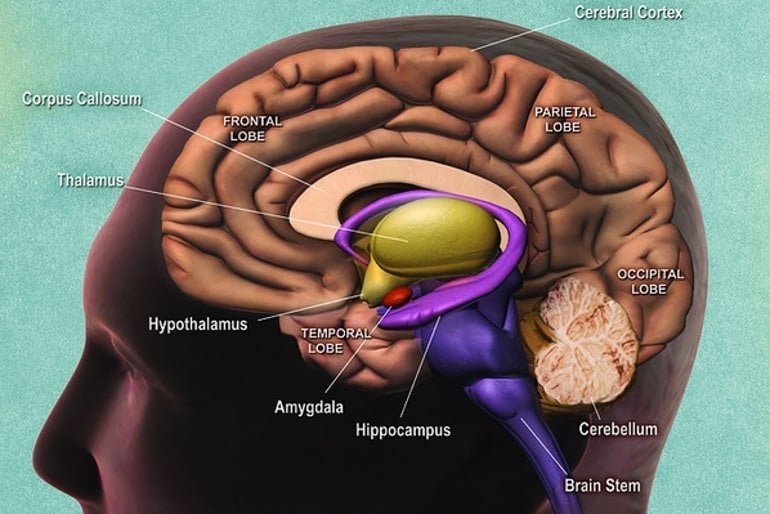Summary: Chronic stress impairs allopregnanolone production in the basolateral amygdala, a brain area associated with mediating emotional response. The reduction of this neurosteroid results in depressive symptoms in animal models.
Source: Tufts University
The latest generation of antidepressants relieves symptoms by mimicking steroids produced by the brain to ensure neurons are effectively talking to each other.
How these neurosteroids are linked to depression and why they work is still to be determined, but a study in mice, led by Tufts University School of Medicine scientists, found chronic stress reduced an animal’s abilities to produce and respond to these important molecules, specifically allopregnanolone.
The research was published Jan. 31 in the journal Biological Psychiatry.
“Our findings suggest that the behavioral deficits following chronic stress involve impaired neurosteroid synthesis and signaling,” says lead author Najah Walton, a PhD student in neuroscience at the Graduate School of Biomedical Sciences.
“We found that mice subjected to chronic unpredictable stress had an impairment in allopregnanolone production within the basolateral amygdala, a brain region crucial for mediating emotional responses.”
To confirm the link, Walton and colleagues in the Maguire Lab at the School of Medicine used CRISPR technology to adjust the enzymes necessary for allopregnanolone production.
Mice with abnormally low levels of the neurosteroid showed depressive behaviors like those that had experienced chronic stress, while their counterparts with abnormally high levels of allopregnanolone showed more resilience to chronic stress.
“The potential implications of these findings suggest that synthetic neurosteroid analogs might exert a beneficial effect in individuals with depression by virtue of their ability to target part of the underlying neuropathology that leads to the condition,” says senior author Jamie Maguire, professor of neuroscience at the School of Medicine.

Less than half of patients with major depression respond to classic antidepressants, such as selective serotonin reuptake inhibitors, and the benefits are known to take weeks or months to take effect. “This study suggests that endogenous neurosteroid synthesis may be an alternative therapeutic target,” says Maguire.
How chronic stress impacts the genes responsible for producing allopregnanolone, how neurosteroids may be involved in the emergence of depression, and how neurosteroid-based treatments benefit the brain will be the focus of the group’s future work.
“For people with depression or experiencing chronic stress, this research could provide some hope that we are making progress in understanding the neurobiology that contributes to the emergence of psychiatric disease,” says Walton, a recent recipient of a Ford Foundation Fellowship.
Research reported in this article was supported by the National Instutite of Mental Health, a division of the National Institutes of Health, under grant numbers R01AA026256, R01NS105628, R01NS102937, R01MH128235, P50MH122379, and a sponsored research agreement with SAGE Therapeutics. Complete information on authors, funders, and conflicts of interest is available in the published paper.
Funding: The content is solely the responsibility of the authors and does not necessarily represent the official views of the National Institutes of Health.
About this depression research news
Author: Jennifer Rosenberg
Source: Tufts University
Contact: Jennifer Rosenberg – Tufts University
Image: The image is credited to NIH
Original Research: Open access.
“Impaired endogenous neurosteroid signaling contributes to behavioral deficits associated with chronic stress” by Najah Walton et al. Biological Psychiatry
Abstract
Impaired endogenous neurosteroid signaling contributes to behavioral deficits associated with chronic stress
Background
Chronic stress is a major risk factor for psychiatric illnesses, including depression. However, the pathophysiological mechanisms whereby stress leads to mood disorders remain unclear. Allopregnanolone acts as a positive allosteric modulator preferentially on δ subunit-containing GABAA receptors (δ-GABAARs). Accumulating clinical and preclinical evidence supports the antidepressant effects of exogenous administration of allopregnanolone analogs; yet the role of endogenous allopregnanolone in the pathophysiology of depression remains unknown.
Methods
We utilized a chronic unpredictable stress (CUS) mouse model, followed by behavioral and biochemical assays to examine whether altered neurosteroid signaling contributes to behavioral outcomes following CUS. We subsequently performed in vivo CRISPR knockdown of rate-limiting enzymes involved in allopregnanolone synthesis, 5α-reductase type 1 and 2 (5α1/2), in addition to lentiviral overexpression of 5α1/2 in the basolateral amygdala (BLA) of mice that underwent CUS to assess the impact of 5α1/2 on behavioral outcomes.
Results
The expression of δ-GABAARs and endogenous levels of allopregnanolone were reduced in the BLA following CUS. Treatment with an exogenous allopregnanolone analog, SGE-516, was sufficient to increase allopregnanolone levels in the BLA following CUS. Knockdown of 5α1/2 in the BLA, mimicked the behavioral outcomes associated with CUS. Conversely, overexpression of 5α1/2 in the BLA improved behavioral outcomes following CUS.
Conclusions
Our findings demonstrate that chronic stress impairs endogenous neurosteroid signaling in the BLA which is sufficient to induce behavioral deficits. Further, these studies suggest allopregnanolone-based treatments may directly target the underlying pathophysiology of mood disorders suggesting that targeting endogenous neurosteroidogenesis may offer a novel therapeutic strategy.







